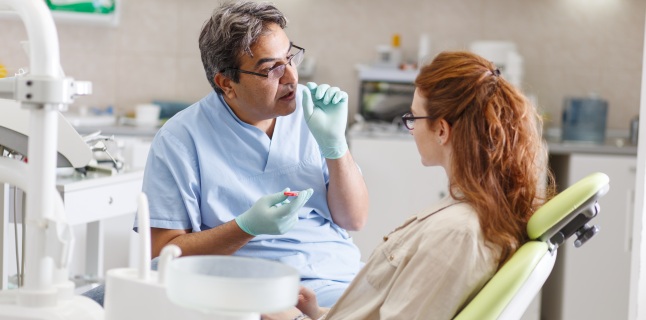Causes and prevention of dental sensitivity

Aggressive tooth brushing, if done daily, results in time to a degree of enamel wear, especially in the place where the tooth meets the gum. Dental erosion also occurs due to the acidic environment found in the oral cavity. The most common cause of dental erosion is the consumption of food and acidic drinks, such as orange juice, beer or carbonated beverages. scratching the teeth at night can cause enamel wear. Dental fracture leads to exposure to dentin and, implicitly, to the appearance of dental sensitivity. Dentine is that part of the tooth that is enamel-covered at the crown level, and at the root level is covered by a very thin layer of a material called cement.
can expose both dentine and dental cement, creating sensitive areas on the surface of the roots. is an inflammation of the gingival tissue, which can favor the retraction of the gum due to the accumulation of dental plaque and tartar. In more serious stages, periodontal bags also appear, spaces that can be occupied by bacteria or dead cells, causing worsening of the situation. Including some dental treatments such as teeth grinding, caries treatment, bleaching treatment, or may cause a temporary increase in dental sensitivity. Fortunately, however, this discomfort disappears in a few days.
The first step is always to take care of the oral health of the oral cavity. Even for the slightest problem it is advisable to consult your dentist. Also, do not forget about mandatory controls once every six months, even if nothing hurts. Brush your teeth at least twice a day with a toothpaste without abrasive agents. Regular oral hygiene reduces the risk of dental sensitivity and helps prevent it from occurring.
Be careful that your brushing is done correctly. Replace your toothbrush if it is worn out or if it has lasted for 2 months after you use it. A worn toothbrush can lead to both gum retraction and wear. At the same time, it is advisable to have a toothbrush with brush mills, and brushing is done gently, gently. Give up as much as possible to acidic foods and acidic drinks.
Ideal is to drink alkaline water and eat more foods that have a pH above 7. Specifically, eat pumpkin, new potatoes, lettuce, parsley, garlic, eggplant, cauliflower, cabbage, peas, etc. . It is recommended to use one that offers protection against sensitivity as well as one that contains neutral sodium fluoride. Remember! .
.
Source : sfatulmedicului.ro
Views : 2910
Popular Article
- (photo) Nude becomes art.
Posted: 2018-03-17, 9810 views.
- The harmful effects of air conditioning on the skin
Posted: 2017-06-08, 8519 views.
- 3 causes of dyed hair discoloration
Posted: 2017-06-15, 8403 views.
- Why early puberty occurs in girls: symptoms, favors, diagnosis and treatment
Posted: 2017-10-24, 8244 views.
- Good or bad skin treatments in the hot season
Posted: 2017-06-07, 7975 views.
Recommendations
- (photo) Nude becomes art.
Posted: 2018-03-17, 9810 views.
- The harmful effects of air conditioning on the skin
Posted: 2017-06-08, 8519 views.
- 3 causes of dyed hair discoloration
Posted: 2017-06-15, 8403 views.
- Good or bad skin treatments in the hot season
Posted: 2017-06-07, 7975 views.
- Risks of practicing sports on hot days
Posted: 2017-06-12, 7549 views.
 4 effective ingredients in the fight against acne.
4 effective ingredients in the fight against acne. How to get rid of hiccups fast
How to get rid of hiccups fast The wheat bran diet: the secret of lost pounds as if by magic
The wheat bran diet: the secret of lost pounds as if by magic The recipe that will sweeten your soul this weekend!
The recipe that will sweeten your soul this weekend!  Is it dangerous or not to refreeze meat after thawing it?
Is it dangerous or not to refreeze meat after thawing it?  The unusual sign of diabetes indicated by saliva.
The unusual sign of diabetes indicated by saliva. What to drink to boost your immune system.
What to drink to boost your immune system. 10 foods that help you never age.
10 foods that help you never age. What actually happens in your body if you drink a cup of coffee for breakfast
What actually happens in your body if you drink a cup of coffee for breakfast 5 surprising benefits of chia seeds
5 surprising benefits of chia seeds